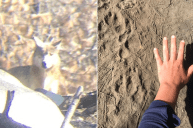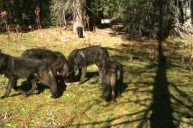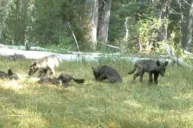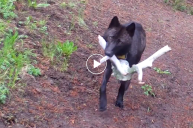Officials are warning hikers that an apex predator has returned to a California park for the first time in a century. However, rather than an ominous sign, it's a cause for celebration.
Hikers have spotted a pack of gray wolves at Lassen Volcanic National Park for the first time since the 1920s. Back then, hunters eradicated them out of the park. A camera captured a family of four wolves traveling the California park. It's a promising sign for the once-endangered species. Officials hope that it's a sign that the populations may thrive once again in the park.
However, officials are warning people not to get to close and to carry bear spray.
Apex Predators At California Park
Park officials wrote in a statement, "It's official! Wolves have been confirmed living in Lassen Volcanic National Park in Northern California! While we do not normally share locations of wolves in this California, because it is in a national park and local media have been reporting on it, we did want to confirm with the public that this is correct."
It continued, "This pack is the pack previously confirmed in October 2024 that consists of 2 breeding adults and a minimum of 2 pups. While gray wolves have been confirmed dispersing through the park such as OR-54, a female wolf born in 2016 to Oregons Rogue Pack. This is the first time a pack has been confirmed inside the national park. They currently do not have a name yet. And this yet to be named wolf pack is one of a dozen groups/packs confirmed living in California. It is unknown what pack at this time the breeding adults are from. "
Meanwhile, others celebrated on social media. One wrote, "Yay!! We needed this shot of hope." Another wrote, "So excited. I hope this pack survives."
Wolf coordinator Axel Hunnicutt also commented on the find. He said, "This finding is also significant as it marks the ninth current pack in California, and the 10th in modern times since wolves began recolonizing CA in the 2010s. As this group was found to have pups, we will be working to monitor their survival into the new year as this will help quantify the recovery of the state's wolf population."




